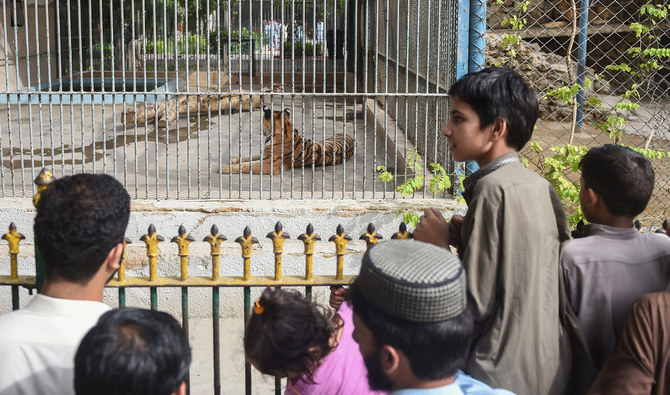KARACHI: A local supplier of food to the Karachi Zoo confirmed on Wednesday it halted its deliveries to the animal sanctuary owing to the non-payment of dues since February, as animal rights activists asked the authorities to shut down the facility and return all the animals to their natural habitat.
The Karachi Zoo is the country’s largest animal sanctuary which was established in 1878 and was called the Mahatma Gandhi Gardens. The place was renamed after Pakistan’s independence, and it currently shelters 834 different varieties of animals and birds.
In October last year, about 40 petitioners filed a case in the Sindh High Court after a video of a 20-year-old Syrian brown bear at the zoo went viral, making many social media users claim that she looked “exhausted.”
This Monday, several people shared another video on social media, showing animals at the zoo in an awful state.
Senior journalist Quatrina Hosain posted a series of tweets as she reacted to the development, saying: “Let’s shut down all zoos.”
She also wondered why the registered contractors had not been paid since February by relevant officials.
Shaniera Akram, an Australian social worker who is married to Pakistan’s former cricketer Wasim Akram, said she was “outraged” to see the footage of malnourished animals.
Speaking to Arab News, the contractor of the zoo, Amjad Mehboob, said his company had restored the food supply to the animal sanctuary after it received assurances that its dues would be cleared next month.
“We have been providing more than 150 items of two different types of foods,” he said. “A daily meal worth around Rs80,000, which includes fruits, meat and fish, is provided to animals like lions, tigers and elephants etc. The rest is provided on a monthly basis.”
He added more than Rs45 million had been pending with the Karachi Metropolitan Corporation (KMC) which had not been clearing his company’s dues.
“We were unable to continue the food supply and conveyed our position to zoo officials and KMC management before ending the supply,” he continued.
However, the director of the animal sanctuary, Khalid Hashmi, maintained the food supply was not halted.
“The animals are in perfect condition,” he told Arab News. “They have been getting their required food in sufficient quantity without any interruption. The supply was never stopped since we keep a monthly stock.”
A KMC spokesperson Ali Hasan Sajid also denied that animals were left without food, saying it was “baseless news” which was spread by people who wanted “to achieve their nefarious aims.”
“A special team constituted by the city administrator Murtaza Wahab paid a surprise visit to the zoo and found ample stocks of food available for an entire week,” he said. “Even the stuff that is provided by contractors on a daily basis were in stock for two days. We have five big deep freezers to keep the meat.”
KMC officials also made their own video of food stock and posted it on Twitter.
“Thousands of citizens visit the zoo every day for leisure and to see the animals closely,” the KMC spokesperson continued. “I invite the media to visit the place on any day and observe the condition of the animals themselves.”
He said if the negative propaganda against the facility and its management did not stop, the authorities would take legal action against those individuals and entities involved in it.
Sajid said the KMC had also provided Rs3 million to the contractor.
While Mehboob confirmed the information, however, he said it was still a small amount compared to Rs45 million of dues.
The new video clips on the social media once again made animal rights activists seek the return of zoo animals to their natural habitat.
Speaking to Arab News, Mahera Omar, co-founder of the Pakistan Animal Welfare Society, said there was need to have a conversation about whether we should be keeping wildlife in zoos.
“It is a cruel thing to deprive animals of their natural habitat,” she said, adding: “Zoos have a dark history of displaying man’s dominion over wild animals from exotic lands. In this modern day and age, with its dwindling biodiversity, shrinking habitats, and a climate crisis, our focus should be on nature-led ecological restoration.”
“Let's keep our wildlife wild and free to exhibit their natural behaviors in the habitats where they belong, and not confine them to a life of misery in zoos,” she maintained.
Meanwhile, the KMC also issued a handout on Wednesday, saying a rare white lion had died at the zoo in Karachi.
The animal was brought to the facility from Africa in 2012 and was about 15 years old.
While the handout maintained that the lion had been suffering from pulmonary tuberculosis, the Karachi administrator, Murtaza Wahab, ordered an inquiry report.
“Strict disciplinary action will be taken against the zoo management if any negligence is found after the cause of death of the lion has come to light,” the official statement quoted as saying.
















